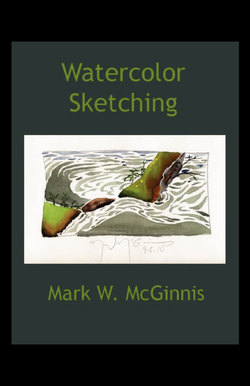Читать книгу Watercolor Sketching - Mark McGinnis - Страница 2
Introduction
ОглавлениеThe Bodhi Tree, Mahabodhi Temple, Bodhgaya, India
While I have been working with watercolor for over thirty-five years, watercolor sketching is a relatively recent addition to my artistic pursuits. At the turn of the millennium I took a research trip to India to prepare for a series of paintings on Buddhist Animal Wisdom Stories and also to travel part of the Buddhist pilgrimage path for personal spiritual growth. I cannot recall what the initial impetus was but for some reason I decided I wanted to do watercolor sketches while I traveled. It was a rather unexpected desire as I had done very little pleine aire (open air) painting. Most of my work has been studio painting where I research and develop long series of carefully planned images. So, to sit out in the open and begin paintings with no preconceived direction was quite out of my character and experience.
To begin with I was a bit uncomfortable. I wanted more control. I tried to do pencil gesture drawings first to block out my compositions but I found the drawing getting in the way of the watercolor so I started painting directly with the watercolor. I immediately found this to be more satisfying and successful. As my trip progressed I began planning my days around my sketching, unexpectedly it became a primary focus.
Upon reflection I understand why this unplanned importance of sketching developed. First, it was the way the painting provided an opening to the people of India. I was amazed at how crowds of people would form around me while I was sketching. I would often have to ask people to move as they would be blocking the view of my subject. I had many wonderful conversations with people that I would have never talked with at all had I not been painting. Second, I found that doing the sketches created a very unique memory bond with the subject I was painting. The memory bond was a complete sensory experience. When I now look at the sketches I can recall the weather, the smells, the people around me, the entire experience of making the painting. This is very strange for me as I can often not remember where I parked my car. Sketching is an experience of the moment that seems to imbed itself deeply into my memory, and as it is nearly always a very pleasurable experience, it is the kind of memories I enjoy holding. A third reason I believe sketching became so important on the trip was the results. I found myself very pleased with most of the sketches I produced (I always do a few “losers” as well as good ones – more on that later). I found the directness of the sketches, the minimal detail, the bold color, and the quickness of the work all very refreshing. Sketching was a wonderful break from the more structured approach of my studio painting.
When I returned home from India I wondered if my enjoyment of the sketching was possibly tied to the spiritual dimension of the trip and would not have the same impact back in my familiar environment. I soon dispelled that notion and found myself bringing my paints wherever I traveled and having the same rewarding experience. One distinct difference with the India experience was the lack of people watching and talking to me as I paint – Americans seem considerably less willing to talk, or less interested.
I then started experimenting with my classes (my perpetual guinea pigs). I found the students quite receptive in the classroom experience, but, as to be expected, a bit inhibited with the freedom of the medium. I later tried a special one-week class after the end of the semester where we made day to trips to various locations in our region. To my surprise and delight I found the students experiencing the same enthusiasm and excitement I was enjoying. I found this to be true independent of their experience level. The freshmen with nearly no watercolor background seemed to be benefiting just as much as my upperclassmen with years of watercolor experience. This has led me to believe that a great deal of the value of watercolor sketching is in the experience. While the products are often very nice indeed, they are secondary to process and the involvement of creating the work.
I believe that watercolor sketching could be a beneficial experience for people on all levels, from professionals that have been painting for many years, to those with little or no art backgrounds who simply want the experience of deeply connecting with their world. I am sure there are thousands of pleine aire painters who discovered these joys long before I did. It is my hope that with this book I can share some of what I have learned and the joy I experience with watercolor sketching.
Mark W. McGinnis
2003
